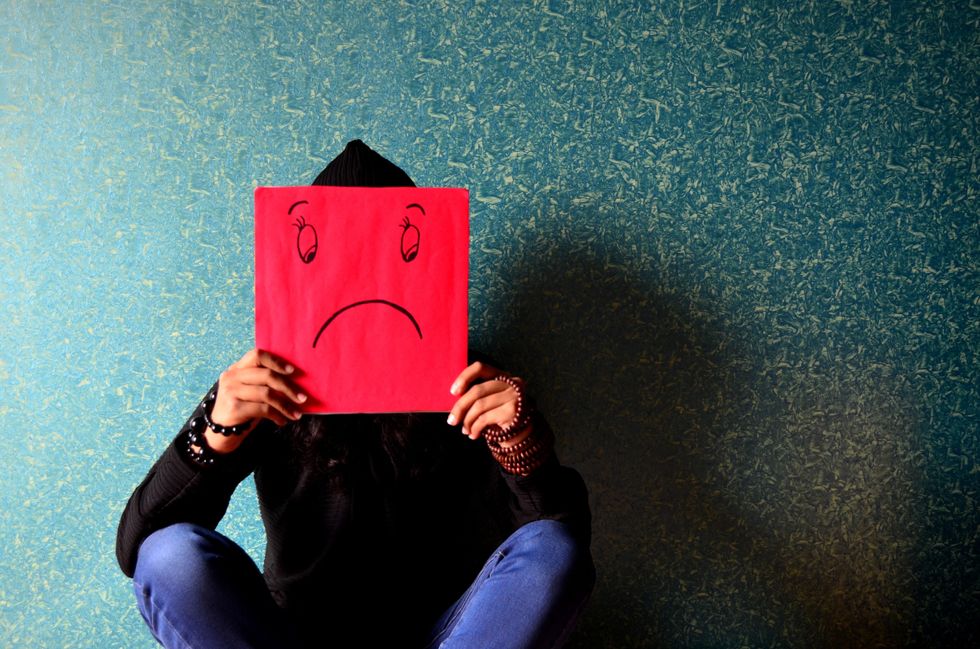Content warning: Suicide.
My 20-year-old friend has tried to kill herself countless times. Baker Acts, cutting, running away from home and eating disorders like bulimia are the manifestations of the darkness that goes on in her mind. Her, like many others', brain chemistry physically keeps a limited number of thoughts in a loop in her head, and although she may try, a lack of awareness keeps her in a hopelessly sad mood, where no amount of words or physical action can shake the feeling of despair.
Upon close inspection, many of my close friends also suffer from these kinds of mentally destructive thought loops, often manifesting themselves as addictions and suicidal thoughts. Alcoholism or any other dependence on a substance is a symptom of these destructive thought loops that arise from a lack of self-awareness. Before they know it, they've been drinking for four days straight, dehydration and poor sleep taking their toll on their mental faculties, and it becomes harder and harder to stop drinking: it's the only thing they have left. Any dependence on a feeling is a manifestation of this, be it food or marijuana or sex.
Having experienced depressive episodes myself, and been on the verge of suicide at one point in my life, I wondered: what is the difference between those of us that suffer from these mental ailments, and those that don't? Why do some people climb mountains and build businesses and go out of their way to love others, while some people can't even fathom the idea of getting out of bed that day?
There are a few things that may make us more likely to engage in addictive behavior, like genetics. This is not a flaw, it's human nature. Before drugs and alcohol and technology, early humans had to be addicted to keeping themselves alive. There was no time to be "depressed," you were either working to build and feed your people or you were resting, there was no in between. When someone is fighting to build a tent for their family and to build a spear, so they can go out and kill an animal to feed their family, what time is there to consider anything but that achievement of that goal?
"Depression" did exist, but it was often after a strong, nearly inconceivable tragedy: think of a mother who's lost her child. Her reason for living was gone, and slowly she would sink into a sadness that deprived her of appetite and will until she died. This, unfortunately, was natural selection. That mother didn't have the mental strength to deal with the death of her child, and therefore could not be of further use to the tribe or to any of her future children, which were likely to be equally as weak, eventually leading to their deaths as well. "Depression" is nature's way of getting rid of the mentally weak.
However, most of us do not have depression. Most of us simply lack the habits and resilience to deal with the sadness when it comes. We will all slip into bouts of intense sadness and lack of motivation; this is normal and human. This will happen to everyone and has happened to everyone since the beginning of time. It will happen to you. And it will happen to you many times.
Those that succumb to the sadness and wither away to death, are those that through several months or even years, do not mentally take care of themselves. They don't keep a journal of their daily thoughts and feelings, they don't exercise control over their body through diet and exercise, they don't give their talents and love to those close to them, and they sink into numbing themselves from their pain instead.
Taking a look at those that do not suffer from mental illness, many patterns emerge. Mentally healthy people take control. They take control of whatever they can. They exercise control over as many things as they can, as often as possible: they work hard at school, they work out to have agency over their bodies, they are careful to give attention and love to those close to them, they work hard at their creative pursuits: painting, writing, dancing, acting, etc.
People that are not depressed go out and fight for their lives every single day. They go to the gym even though it's the last thing they want to do. Even though they are dreading studying for that exam, they drag themselves out to a coffee shop and do it anyway. Even though their legs are begging them to stop running that marathon, they order their body to take that next step. People without depression are those that actively go out and fight it. They fight for their lives the way early humans fought for theirs. There's no time to be depressed when you're busy hitting a personal record, or when you're painting something pretty for yourself. There's no time to be depressed when you're too busy loving others and giving them your time and talents. There's no time to be depressed when you're out living.
We often look to numb ourselves with anything we can. Food, nicotine, alcohol, marijuana, and sex are all basic things we cling to numb ourselves so that we don't have to feel the pain of whatever it is that is hurting us. However, the only way to get rid of pain is to push through it. No amount of numbing or running from it will make it go away, so the only way to solve it is to face it, head on, and brave and sensitive. You must be willing to feel the intense negative emotions as well as the intense positive ones. It will be difficult, but it's not any more difficult than anything anyone else has ever done, and you, dearest human, are capable of it. It's in your nature to be capable of it, you just have convinced yourself that you can't.
Obviously, if you're struggling, nobody is expecting you to go out tomorrow and conquer a mountain. Instead, take control of one thing that day. Make a meal for yourself. Even if and when it tastes bad, enjoy it. Savor it, and plan how you'll do it better next time. Set a goal of saying one nice thing to five people, and do not care what they say back. Give them the gift of a genuine compliment, and watch how their eyes light up. You'll feel better. Commit yourself to a run that sounds hard. Two miles? Put on your music and think of nothing else except finishing those two miles. It can be anything, but you must challenge yourself.
You cannot expect your life to be easy or simple or without a struggle. Understand that it will get difficult, and sometimes, it will be unbearably so. But you must keep fighting. You must fight to live. Your mental health -your life- depends on it.
If you or someone you know is experiencing suicidal thoughts, call the National Suicide Prevention Hotline — 1-800-273-8255






















